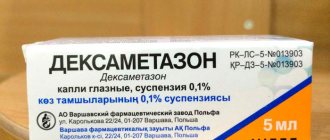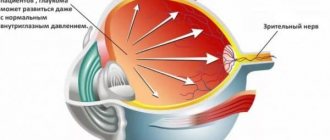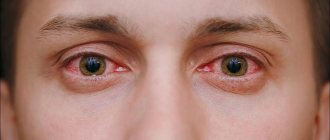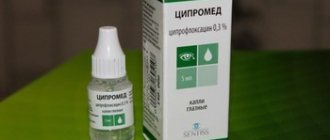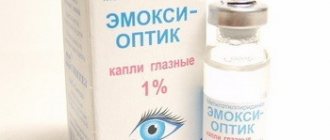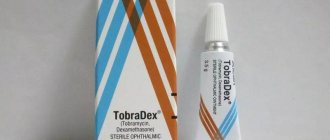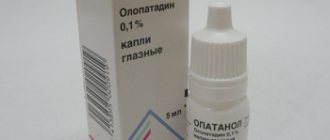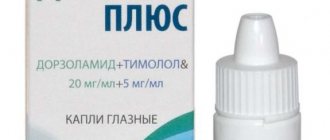Aktipol drops and solution belong to the group of antiviral drugs that are used to eliminate symptoms of infection, such as swelling, restoration of tissue damaged due to surgery or thermal burns.
The action of the drug is based on increasing the activity of enzymes, which results in the production of a protein that destroys pathogenic microflora, providing immunomodulatory, antioxidant and regenerating properties of the drug.
Indications for use
Actipol is recommended for use in the treatment of viral conjunctivitis, keratoconjunctivitis, as well as keratouveitis caused by pathogens such as adenovirus, herpes simplex, herpes zoster. Used in the treatment of infectious, post-traumatic and postoperative keratopathies, burns and eye injuries, as well as diseases of the retina and cornea, characterized by dystrophy.
The drug reduces the period of adaptation to contact lenses, improves their tolerability, and also eliminates discomfort from wearing lenses for a long time and working at a computer.
Pharmacological effects on the body
Aktipol eye drops, by stimulating the production of interferon, provide an active fight against viral lesions. The development of the molecular structure was carried out taking into account the fact that corneal cells have a special structure. The active substance can bypass the membrane in a short time and help in the restoration of affected tissues. This medicine will not affect the formation of tears and does not take part in other processes occurring in the human body.
In addition to the fact that the work of the drug Actipol triggers a process in which the synthesis of interferon is activated, the body receives a strong effect of antioxidants. Under the influence of Aktipol eye drops, corneal cells are quickly restored, but this does not affect the condition of healthy tissues.
Using Aktipol drops according to the instructions, you can speed up tissue restoration after operations, burns, injuries and improve the general condition of the body.
Directions for use and dosage
The drug is used in the form of eye drops, subconjunctival, parabulbar and retrobulbar injections.
Actipol eye drops are prescribed 1-2 drops three to eight times a day, depending on the severity of the inflammatory process.
For injections, the dose varies from 0.3 to 0.5 ml. The treatment course ranges from 3 to 15 injections. The drug is also used as eye drops for instillation, 2 drops 3–8 times a day. In the case of superficial forms of herpetic keratitis, in accordance with the course of the disease, injections are prescribed after 1, 2 or 3 days, and instillation is carried out 2 drops 4 to 8 times during the day. For the treatment of deep forms of herpetic keratitis, at the beginning of treatment, injections are prescribed once daily, after which they proceed to use once every 2 or 3 days, combined with instillations 4–8 times a day, in accordance with the severity and course of the disease. For both forms of herpetic keratitis, after clinical recovery, it is recommended to continue using Actipol eye drops 3 times a day for 7–10 days. In the case of dystrophic pathologies of the retina, perivasal injections of 1 ml in the temporal areas or parabulbar injections of 0.5 ml are prescribed. The treatment course is 10–12 injections.
Release form and composition
- Solution for injection and instillation into the eye 0.007%: colorless transparent liquid (1 and 2 ml in ampoules, 10 or 50 ampoules complete with an ampoule knife in a cardboard package);
- Eye drops 0.007%: colorless transparent liquid (5 ml in polymer/plastic dropper bottles or glass bottles, or in bottles with a dropper cap, 1 bottle in a cardboard pack, 50 bottles in a cardboard box).
1 ml of solution and drops contains:
- Active substance: para-aminobenzoic acid – 0.07 mg;
- Additional components: water for injection and sodium chloride.
Actipol eye drops and substances with similar effects
If the drug Aktipol is not available in the pharmacy, with the permission of the doctor, it can be replaced with products that have similar effects on the body. Analogues of the drug Actipol for the treatment of eye diseases can be listed as follows:
- Poludan;
- Okoferon;
- Oftalmoferon.
You can turn to medications with a similar effect in cases where the patient has an individual intolerance to the ingredients in Actipol drops.
It is not recommended to look for a replacement medication on your own - try to consult a doctor to develop a course of treatment.
Side effects from the components of the drug
Actipol, like its analogues, is generally quite well tolerated by the body. But there is not a single medicine that would suit absolutely everyone. Regarding the medicine Actipol, it can be added that eye drops can easily cause redness of the conjunctiva, reduce the clarity of vision, and provoke allergies.
Conditions such as pregnancy and lactation are not an obstacle to therapy using this drug. A series of experiments was carried out, which made it possible to reliably find out that Aktipol will not negatively affect the fetus developing in the womb.
If you accidentally take the medicine orally, there will be no significant side effects. It is possible that the combination of substances in the medication will cause diarrhea or minor problems with food digestion.
The condition is usually short-lived and does not bring any negative consequences.
Additional information and necessary precautions when treating with the drug
It is recommended to start using Actipol for treatment only after receiving approval from an ophthalmologist. During the consultation, the specialist will consider factors such as the patient’s health condition and the advisability of treatment with this drug. Based on this, a decision will be made on the need to use a medicinal substance. Aktipol eye drops can also be used for children after consultation with an ophthalmologist. The drug may be approved for therapeutic use.
The use of the drug Actipol will not affect sensitivity to light and does not impair the sensitivity of flowers. The work that the drug performs in the body does not affect the quality of psychomotor reactions. This is convenient because patients can drive immediately after instillation. You will not have to ask for time off from work for the period of treatment if the nature of your activity involves operating complex devices or mechanisms that require extreme concentration.
During treatment with Actipol eye drops, you should not take sulfonamides together. A greater therapeutic effect can be achieved by supplementing treatment with nucleosides and antibiotic drugs. The decision to prescribe any combinations must be made by the attending physician.
Actipol eye drops
Instructions for medical use of the drug
Description of pharmacological action
It is an inducer of endogenous interferon, which explains one of the mechanisms of specific antiviral action. It has a radioprotective effect, regulates the water-salt balance, stimulates corneal regeneration processes, and does not have a teratogenic, mutagenic or embryotoxic effect.
Indications for use
Viral conjunctivitis, keratoconjunctivitis, keratouveitis caused by Herpes simplex, Herpes zoster, adenovirus, keratopathies of infectious, post-traumatic and post-operative origin, dystrophic diseases of the retina and cornea, burns and eye injuries, discomfort associated with eye strain and fatigue, incl. when wearing contact lenses.
Release form
eye drops 0.007%; glass bottle (bottle) 5 ml with a dropper cap, cardboard pack 1. eye drops 0.007%; polymer dropper bottle 5 ml, cardboard box (box) 50.
Pharmacodynamics
Antiviral, antioxidant, immunomodulatory. Actipol is an inducer of endogenous interferon, which explains one of the mechanisms of specific antiviral action. It has a radioprotective effect, regulates the water-salt balance, stimulates corneal regeneration processes, and does not have a teratogenic, mutagenic or embryotoxic effect.
Pharmacokinetics
When administered topically, para-aminobenzoic acid is rapidly absorbed and exhibits a therapeutic effect.
Contraindications for use
Hypersensitivity to the components of the drug. To date, there are no clinical trial data regarding the use of the drug during pregnancy, lactation, or in children. However, the drug can be used if the expected benefit outweighs the possible risk.
Side effects
Rarely, conjunctival hyperemia, local allergic reactions.
Directions for use and doses
Locally: instill 1-2 drops into the conjunctival sac 3-8 times a day. After clinical recovery, continue instillation of 2 drops 3 times a day for 7 days. Subconjunctival, parabulbar, retrobulbar: injections of 0.3–0.5 ml. Course of 3–15 injections. For superficial forms of herpetic keratitis, injections are made after 1 day or after 2–3 days in combination with instillations of 2 drops 4–8 times a day, depending on the course of the disease. For deep forms of herpetic keratitis, injections are initially carried out once daily, then after 2–3 days in combination with instillation of 2 drops 4–8 times, depending on the severity and dynamics of the disease. After clinical recovery in both forms of the disease, instillations of 2 drops per day are continued for 7–10 days. Perivasal: for retinal dystrophies - injections of 1 ml; course of treatment - 10 injections.
Overdose
Accidental ingestion does not pose a risk of unwanted side effects.
Interactions with other drugs
In combination with modified nucleosides (acyclovir, ganciclovir, fludarabine phosphate, etc.) and antibiotics, the therapeutic effect is enhanced. Do not use simultaneously with sulfonamide drugs (albucid) or with Encad when used topically.
Storage conditions
In a place protected from light, at a temperature not exceeding 40 °C. After opening the package, store for 7 days (glass bottles) and 14 days (dropper bottles made of polymer material).
Best before date
24 months
ATX classification:
S Sense organs
S03 Preparations for the treatment of eye and ear diseases
S03D Other preparations for the treatment of eye and ear diseases
Contraindications and side effects
Despite the known safety of the drug, it is worth consulting with a specialist before use.
The drug has virtually no contraindications; the main limitation of its use applies to people who have hypersensitivity to the components of the drug.
When deciding to prescribe a drug in such cases, the doctor proceeds from the fact that the benefit achieved by using the drug must outweigh the potential risk.
Among the side effects caused by the use of the drug, the manufacturer notes the possibility of redness of the conjunctival area and the appearance of local allergic-type reactions.
Analogs
Since the drug is very popular, you can find many of its analogues on the pharmaceutical market. Which of these drugs are not only similar in composition and properties, but also have a decent effectiveness of positive effects?
- Oftalmoferon.
- Okoferon.
- You can also resort to using Poludan eye drops.
Despite the fact that these products are considered analogues, you should not use them independently without first consulting a doctor. The fact is that each medication has its own contraindications and unique components in its composition. Thoughtless use of such products can lead to a critical decrease in vision. Find out what to do if your vision deteriorates here.
The attending physician should warn that the combined use of Actipol drops with Albucid and Enkad is not recommended, since there is a high probability of a deterioration in overall health.
The medicine combines well with antibiotics, while enhancing their effect on the body. However, it is still not worth exceeding the dosage of Actipol for no apparent reason. In case of severe dryness, you can additionally use Systane Ultra drops described in this material.
Oftalmoferon
Aktipol - indications, instructions
The Aktipol solution, which is an eye drop, comes with detailed instructions. It contains a list of pathological conditions for which the use of a medicinal substance is recommended. Diseases for which treatment with Actipol eye drops are as follows:
- Viral conjunctivitis;
- Keratopathies – which began after operations, of infectious origin;
- Mechanical injuries in which eye tissue is damaged;
- Dystrophic lesions that have affected the area of the retina and cornea;
- Keratouveitis, which appeared due to adenovirus.
The instructions for taking Aktipol drops allow the use of the medicine in cases where the visual organs constantly receive serious stress. This can happen with constant long-term work at the computer, frequent viewing of film frames, and carrying out various manipulations that involve the use of a microscope. Using Aktipol moisturizes the mucous membrane and eye sclera, preventing capillary fragility. In addition, susceptibility to electromagnetic rays increases significantly.
Aktipol's analogs
There is a wide choice of analogues, so the issue of replacing the drug in case of intolerance is easy to solve.
The drug has no analogues in terms of the active substance used, however, there are known drugs recommended for individual intolerance to Actipol, similar to it in therapeutic effect. These include drugs such as
- Reaferon EU;
- Alfaron;
- Poludan;
- Oftalmoferon.
The drug is used for antiviral therapy for damage to the cornea, retina and conjunctival area of the eye. Aktipol drops are highly effective and have virtually no contraindications or negative effects associated with their use.
However, the instructions for using the drops and the treating ophthalmologists recommend adhering to the prescribed doses, on which the result of treatment depends.
How to choose the right antiviral drugs is detailed in the video:
Aktipol, cost
The price of Aktipol in the form of eye drops is quite affordable. For therapeutic use, it can be purchased by patients of any income level. A bottle containing medicinal liquid can cost in different pharmacies in the range of 120-200 rubles - the final cost is determined depending on the pricing policy of the distributor. You can find this drug in pharmacies without any problems. But you can purchase it only by presenting a prescription written by an ophthalmologist.
Similar drugs:
- Groprinosin Oral tablets
- Choludexan Capsule
- Lactobacterin siccum dry (Lactobacterin siccum) Lyophilisate for the preparation of solution for oral administration
- Wobenzym Oral tablets
- Anaferon for children (Anaferon filios) Lozenges
- Ursosan Capsule
- Bifidumbacterin Capsule
- Immunoflazidum (IMMUNOFLAZIDUM) Syrup
- Isoprinosine Oral tablets
- Derinat Solution for injection
** The Drug Directory is intended for informational purposes only. For more complete information, please refer to the manufacturer's instructions. Do not self-medicate; Before starting to use the drug Aktipol, you should consult a doctor. EUROLAB is not responsible for the consequences caused by the use of information posted on the portal. Any information on the site does not replace medical advice and cannot serve as a guarantee of the positive effect of the drug.
Are you interested in the drug Actipol? Do you want to know more detailed information or do you need a doctor's examination? Or do you need an inspection? You can make an appointment with a doctor - the Euro lab is always at your service! The best doctors will examine you, advise you, provide the necessary assistance and make a diagnosis. You can also call a doctor at home . Euro lab clinic is open for you around the clock.
** Attention! The information presented in this medication guide is intended for medical professionals and should not be used as a basis for self-medication. The description of the drug Aktipol is provided for informational purposes and is not intended for prescribing treatment without the participation of a doctor. Patients need to consult a specialist!
If you are interested in any other drugs and medications, their descriptions and instructions for use, information about the composition and form of release, indications for use and side effects, methods of use, prices and reviews of drugs, or you have any other questions and suggestions - write to us, we will definitely try to help you.
